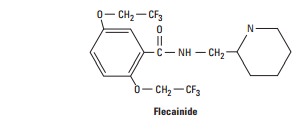Chapter: Basic & Clinical Pharmacology : Agents Used in Cardiac Arrhythmias
Flecainide (Subgroup 1C)
FLECAINIDE (SUBGROUP 1C)
Flecainide
is a potent blocker of sodium and potassium channels with slow unblocking
kinetics. (Note that although it does block certain potassium channels, it does
not prolong the action poten-tial or the QT interval.) It is currently used for
patients with otherwise normal hearts who have supraventricular arrhythmias. It
has no antimuscarinic effects.

Flecainide
is very effective in suppressing premature ventricular contractions. However,
it may cause severe exacerbation of arrhythmia even when normal doses are
administered to patients with preexisting ventricular tachyarrhythmias and
those with a previous myocardial infarction and ventricular ectopy. This was
dramatically demonstrated in the Cardiac Arrhythmia Suppression Trial (CAST),
which was terminated prematurely because of a two and one-half-fold increase in
mortality rate in the patients receiv-ing flecainide and similar group 1C
drugs. Flecainide is well absorbed and has a half-life of approximately 20
hours. Elimination is both by hepatic metabolism and by the kidney. The usual
dos-age of flecainide is 100–200 mg twice a day.
Related Topics